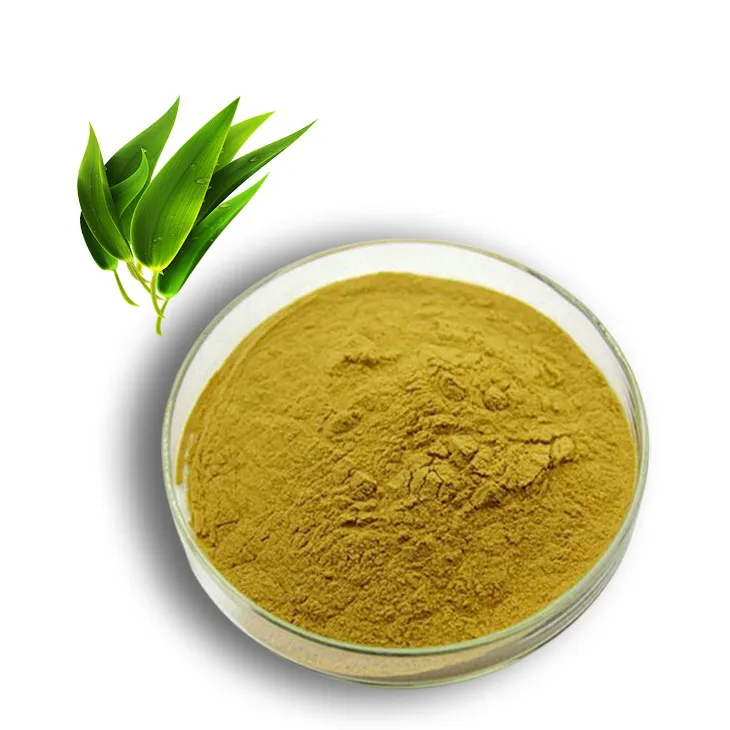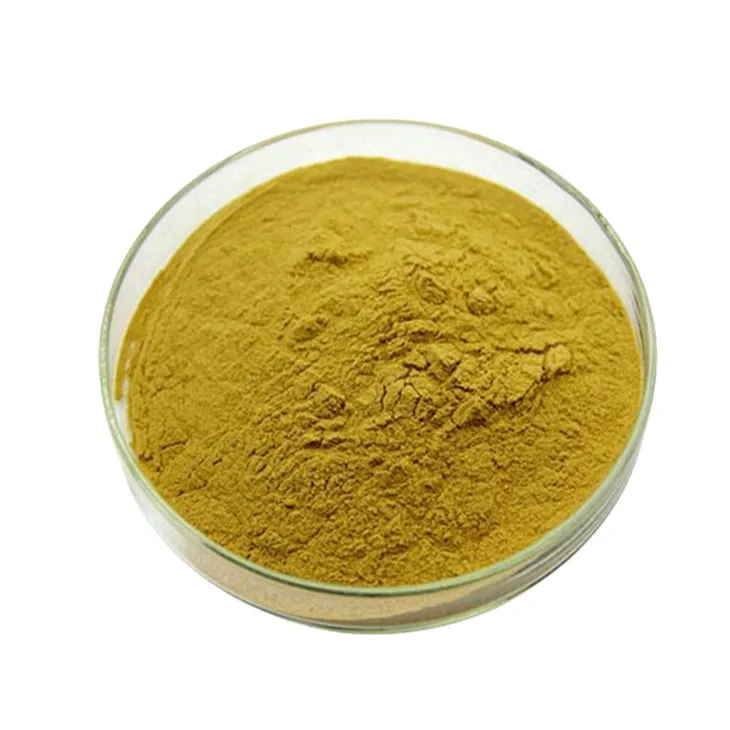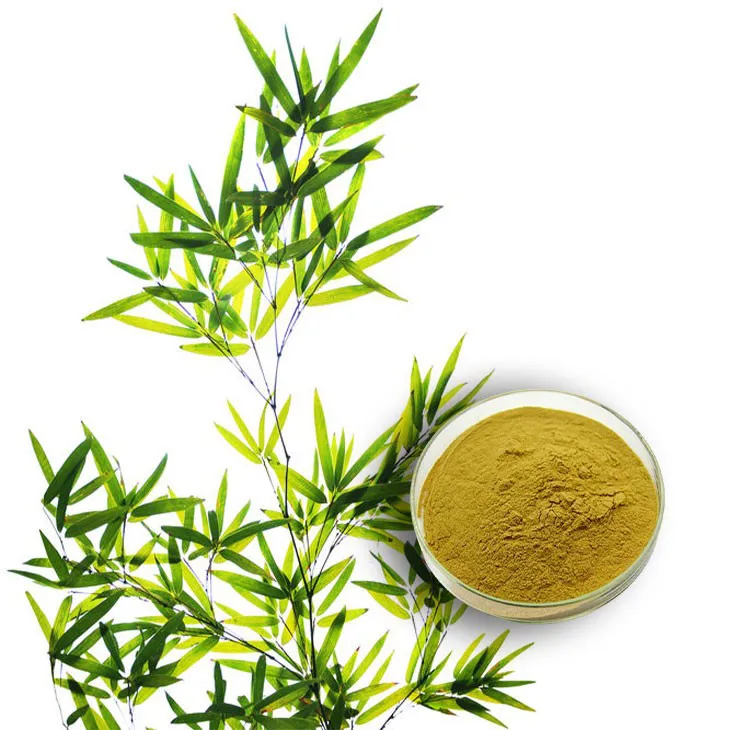- 0086-571-85302990
- sales@greenskybio.com
A Guide on How to Get the Most Favorable Price for Unsweetened Bamboo Leaf Extract.
2024-12-10

1. Introduction
Unsweetened Bamboo Leaf extract has been gaining popularity in various industries, such as the food, beverage, and pharmaceutical sectors. It is rich in bioactive compounds with potential health benefits. However, getting the most favorable price for this product can be a challenging task. This article aims to provide comprehensive guidance on achieving the best deal when purchasing unsweetened Bamboo Leaf extract.

2. Understanding the Product
Before delving into the strategies for getting a favorable price, it is crucial to have a good understanding of unsweetened Bamboo Leaf extract.
2.1 Composition
Unsweetened bamboo leaf extract typically contains flavonoids, phenolic acids, and other bioactive substances. These components contribute to its antioxidant, anti - inflammatory, and antimicrobial properties. Knowing the composition can help in evaluating the quality and potential value of the extract.
2.2 Applications
In the food industry, it can be used as a natural preservative or flavor enhancer. In the pharmaceutical field, it may be studied for its potential in treating various diseases. In the beverage industry, it can be added to teas and other healthy drinks. Understanding the applications can give an idea of the market demand and price trends associated with different uses.

3. Sourcing Strategies
Effective sourcing strategies play a vital role in obtaining the most favorable price for unsweetened bamboo leaf extract.
3.1 Domestic vs. International Suppliers
- Domestic Suppliers:
- Advantages: Shorter lead times, easier communication, and potentially lower transportation costs. They may also be more familiar with local regulations. However, the domestic market may have a limited number of suppliers, which could limit competition and potentially lead to higher prices.
- Disadvantages: In some cases, the scale of production may be smaller compared to international suppliers, which could result in less cost - effective production.
- International Suppliers:
- Advantages: Often offer a wider range of products in terms of quality and price. Larger - scale production in some countries can lead to lower per - unit costs. There may be more competition among international suppliers, which can drive prices down.
- Disadvantages: Longer lead times, potential language barriers, and complex international regulations regarding import and export. There may also be higher transportation costs and risks associated with customs clearance.
3.2 Direct vs. Indirect Sourcing
- Direct Sourcing:
- Advantages: Eliminates the middleman, which can potentially lead to lower prices. It also allows for better communication with the source of the product, enabling more control over quality and production processes. For example, a company can directly negotiate with a bamboo leaf extract manufacturer about specific requirements such as extraction methods and quality control measures.
- Disadvantages: Requires more resources in terms of time and effort for finding and evaluating suppliers. There may be higher minimum order quantities (MOQs) when dealing directly with manufacturers, which could be a challenge for small - scale buyers.
- Indirect Sourcing:
- Advantages: Can be more convenient, especially for small - scale buyers. Wholesalers or distributors may offer smaller MOQs and may already have a range of pre - screened suppliers. They can also provide additional services such as storage and packaging.
- Disadvantages: Higher prices due to the markup by the middlemen. There may be less control over the quality and production process as the buyer is further removed from the source.
3.3 Supplier Evaluation
- Quality Assurance: Check if the supplier has proper quality control systems in place. This includes certifications such as ISO standards for manufacturing processes and quality management. For example, ISO 9001 certification indicates that the supplier has a reliable quality management system.
- Production Capacity: Ensure that the supplier can meet your expected order quantity. A supplier with a large production capacity may be able to offer more competitive prices, especially for large - volume orders.
- Reputation: Look for reviews and testimonials from other customers. A supplier with a good reputation is more likely to provide high - quality products and reliable service. You can also check if the supplier has any industry awards or recognition.
- Research and Development: A supplier that invests in research and development may be able to offer innovative products or more cost - effective production methods. For example, they may be exploring new extraction techniques that can improve the quality and yield of the bamboo leaf extract.

4. Market Trends
Staying informed about market trends is essential for getting the best price for unsweetened bamboo leaf extract.
4.1 Supply and Demand Dynamics
- If the demand for unsweetened bamboo leaf extract is increasing rapidly, while the supply is relatively stable or growing at a slower pace, prices are likely to rise. For example, if there is a new trend in the health food market for products containing bamboo leaf extract, more companies will be competing for the available supply, driving up prices.
- Conversely, if the supply outpaces demand, prices may fall. This could happen if there are new large - scale production facilities coming online, increasing the overall supply in the market.
4.2 Price Fluctuations over Time
- Seasonal factors can affect the price of bamboo leaf extract. Bamboo growth may be affected by seasons, which in turn can influence the availability of raw materials for extraction. For example, during the off - season, the price may be higher due to limited supply.
- Economic factors such as inflation, currency exchange rates, and changes in production costs can also cause price fluctuations. If the cost of labor or raw materials in the producing regions increases, the price of the extract is likely to go up.
4.3 Emerging Trends in the Industry
- New applications of bamboo leaf extract may create new market segments and influence prices. For example, if research discovers new health benefits of the extract, leading to its use in new pharmaceutical products, the demand from the pharmaceutical industry may increase, affecting the overall market price.
- Technological advancements in extraction methods can also impact prices. More efficient extraction techniques may reduce production costs, which could potentially lead to lower prices for the end - product.

5. Negotiation Tips
Effective negotiation can significantly reduce the price of unsweetened bamboo leaf extract.
5.1 Preparation
- Research the market price range thoroughly. Know the average prices offered by different suppliers and the factors that can influence these prices. This information will give you a baseline for negotiation.
- Define your requirements clearly. This includes the quantity you need, the quality specifications, and any special requirements such as packaging or delivery terms. Having a clear understanding of your needs will help you communicate effectively during the negotiation.
- Identify your alternatives. Know other potential suppliers and their offerings. This will give you leverage during the negotiation, as you can mention that you have other options if the current supplier does not meet your price expectations.
5.2 Communication
- Build a rapport with the supplier. Establishing a good relationship can make the negotiation process more amicable. For example, start the conversation by showing interest in their business and products.
- Be clear and concise in your communication. State your requirements and price expectations clearly. Avoid ambiguity, as it can lead to misunderstandings during the negotiation.
- Listen to the supplier's perspective. Understand their constraints and challenges. This can help you find mutually beneficial solutions during the negotiation.
5.3 Bargaining Tactics
- Ask for discounts based on volume. If you are planning a large - volume order, use this as a bargaining chip. For example, you can say that you expect a certain percentage discount for ordering a large quantity.
- Negotiate on non - price terms. Instead of focusing solely on the price, consider other aspects such as delivery time, payment terms, or additional services. For instance, you can ask for extended payment terms in exchange for a slightly higher price.
- Be willing to walk away. If the supplier is not willing to meet your price or terms, be prepared to end the negotiation. This shows that you are not desperate and have other options.
6. Conclusion
Getting the most favorable price for unsweetened bamboo leaf extract requires a comprehensive approach. By understanding the product, implementing effective sourcing strategies, staying informed about market trends, and using proper negotiation techniques, buyers can significantly increase their chances of securing a cost - effective deal. It is important to continuously monitor the market and adapt these strategies as needed to ensure long - term success in obtaining the best value for this valuable extract.
FAQ:
Question 1: What are the common sourcing strategies for unsweetened bamboo leaf extract?
One common sourcing strategy is to directly contact bamboo leaf extract manufacturers. This allows you to cut out middlemen and potentially get a lower price. Another option is to explore international markets, as some regions may have lower production costs and offer more competitive prices. Additionally, attending industry trade shows and exhibitions can help you connect with multiple suppliers at once and compare their offerings.
Question 2: How can I stay updated on the market trends of unsweetened bamboo leaf extract?
You can subscribe to industry newsletters and magazines that focus on natural extracts. These often provide market analysis, price trends, and new product developments. Online market research platforms are also useful, as they can aggregate data from various sources. Moreover, following industry experts on social media or joining relevant professional groups can give you insights into the latest market trends.
Question 3: What are some effective negotiation tips when dealing with suppliers of unsweetened bamboo leaf extract?
First, do your research on the market price range before entering negotiations, so you have a clear understanding of what is a reasonable offer. Second, try to build a good relationship with the supplier, as this may make them more inclined to offer a better price. You can also consider volume purchases and use this as a bargaining chip. For example, if you commit to a large - quantity order, you can ask for a price discount. Another tip is to be flexible with payment terms, such as offering to pay earlier in exchange for a lower price.
Question 4: Are there any certifications or quality standards that affect the price of unsweetened bamboo leaf extract?
Yes, certifications like organic certifications or Good Manufacturing Practice (GMP) certifications can impact the price. Suppliers with these certifications often have higher production costs due to adhering to strict quality control measures. However, these products may also command a higher price in the market as they are perceived as being of higher quality. So, if you are looking for a lower - cost option, you may need to consider products without certain certifications, but be aware of the potential quality differences.
Question 5: How does the seasonality affect the price of unsweetened bamboo leaf extract?
Seasonality can play a role in the price. Bamboo leaf growth may be affected by seasons, which can in turn influence the availability of raw materials for extraction. During peak harvest seasons, there may be more supply, potentially leading to lower prices. Conversely, during off - seasons, when supply is limited, prices may be higher. Additionally, factors such as weather conditions during the growing season can also impact the quality of the bamboo leaves and thus the price of the extract.
Related literature
- Analysis of Bamboo Leaf Extract Market Trends"
- "Sourcing Strategies for Natural Extracts: The Case of Bamboo Leaf Extract"
- "Negotiation Tactics in the Extract Industry: Focus on Bamboo Leaf Extract"
- ▶ Hesperidin
- ▶ citrus bioflavonoids
- ▶ plant extract
- ▶ lycopene
- ▶ Diosmin
- ▶ Grape seed extract
- ▶ Sea buckthorn Juice Powder
- ▶ Beetroot powder
- ▶ Hops Extract
- ▶ Artichoke Extract
- ▶ Reishi mushroom extract
- ▶ Astaxanthin
- ▶ Green Tea Extract
- ▶ Curcumin Extract
- ▶ Horse Chestnut Extract
- ▶ Other Problems
- ▶ Boswellia Serrata Extract
- ▶ Resveratrol Extract
- ▶ Marigold Extract
- ▶ Grape Leaf Extract
- ▶ blog3
- ▶ blog4
- ▶ blog5
-
Pure 85% Tomentil Extract.
2024-12-10
-
Sophora Japonica Flower Extract
2024-12-10
-
Motherwort Extract
2024-12-10
-
Citrus bioflavonoids
2024-12-10
-
Purple Sweet Potato Extract
2024-12-10
-
Garcinia Cambogia Extract
2024-12-10
-
Chaste Berry Extract
2024-12-10
-
Dandelion Root Extract
2024-12-10
-
Nettle Root Extract
2024-12-10
-
Yohimbine Bark Extract
2024-12-10
-
Hericium erinaceus extract powder
2024-12-10





















